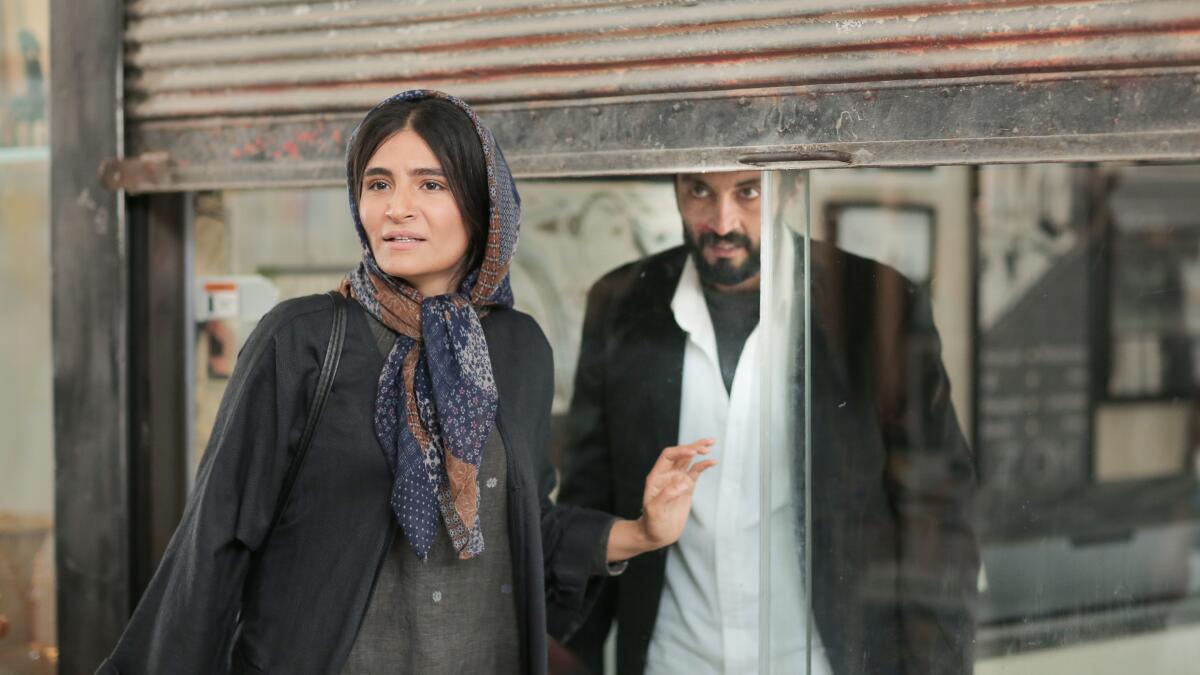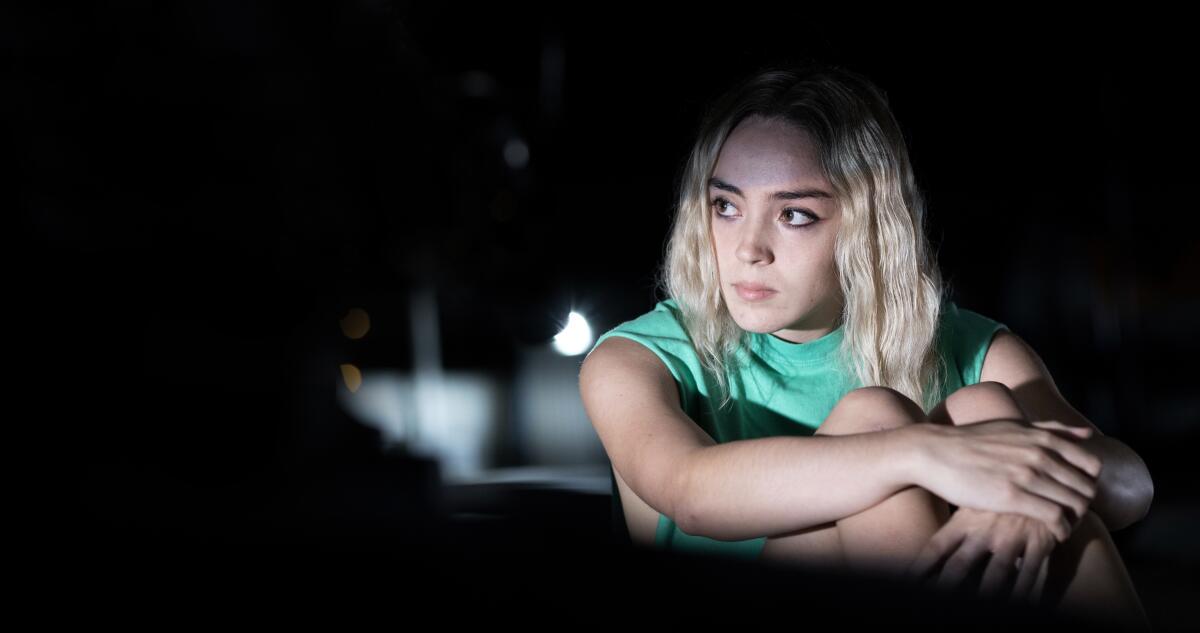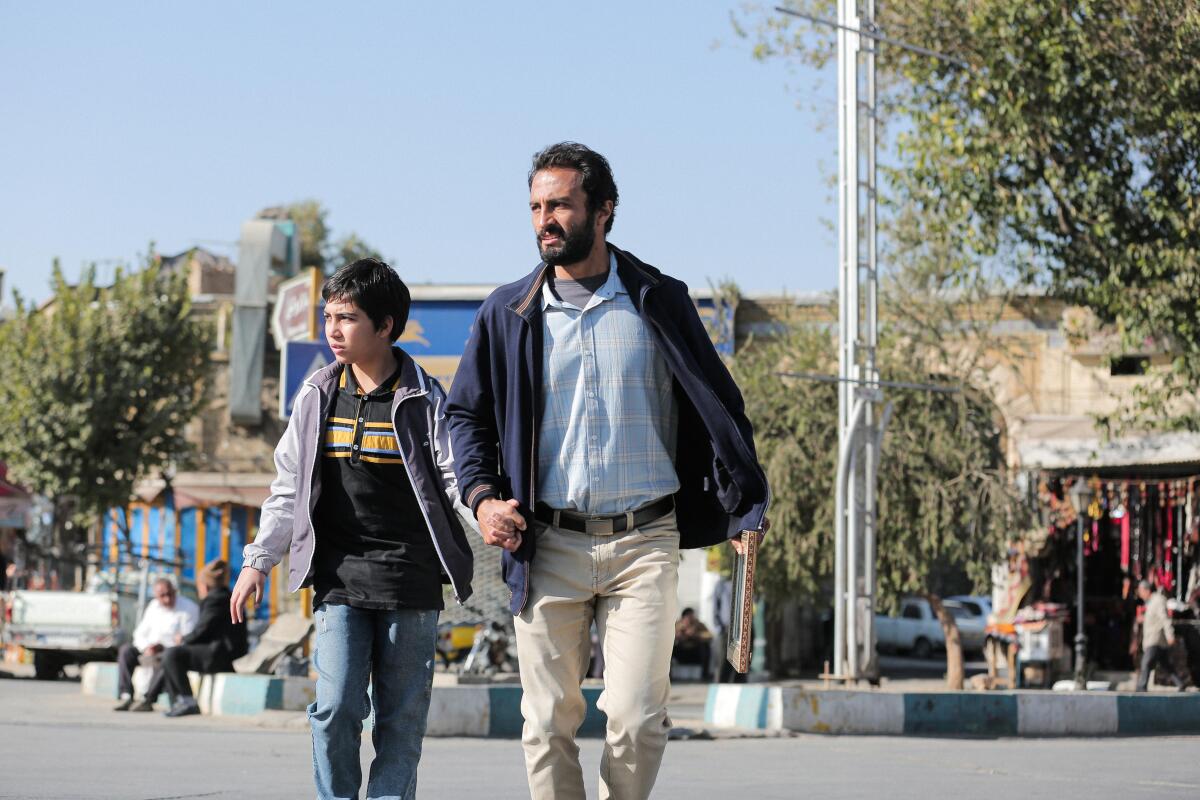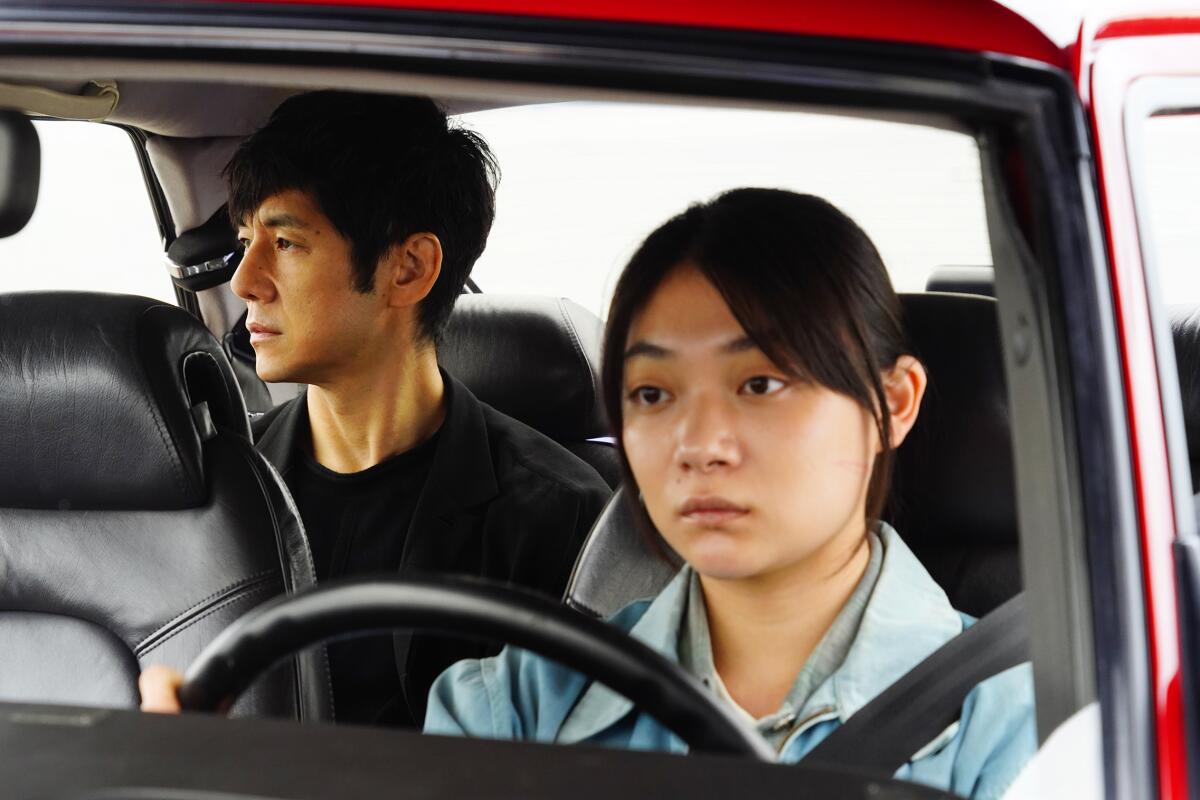‘Titane,’ ‘A Hero,’ ‘Drive My Car’: Unconventional storytelling links international films

- Share via
This year’s international feature Oscar race is a competitive one. Among the many strong submissions are films from well-known auteurs, including Colombia’s entry from Apichatpong Weerasethakul, the Tilda Swinton-starring “Memoria”; China’s Zhang Yimou (“Cliff Walkers”); Italy’s Paolo Sorrentino (“The Hand of God”); as well as a relatively new generation of directors such as Denmark’s Jonas Poher Rasmussen (“Flee”); Germany’s Maria Schrader (“I’m Your Man”); and Mexico’s Tatiana Huezo (“Prayers for the Stolen”). And, as these three additional contenders demonstrate, a wide range of subject matter and aesthetic.
‘Titane’
France

Julia Ducournau’s 2021 Cannes Palme d’Or winner centers on Alexia (Agathe Rousselle), a psychopathic professional stripper on the run who finds herself taking on a male identity to avoid the authorities. And, while she hides out pretending to be the long-lost son of a veteran firefighter (Vincent Lindon) she also has an unexpected and unconventional pregnancy to deal with. As Rousselle details, “She had this car accident [as a child] and she had this metal piece screwed inside her head. She happens to be attracted to cars and then she has sex with a car and gets impregnated by a car. It’s actually science fiction, but if you think about it, it’s kind of normal. It’s kind of in a world where it would be possible.”
That might seem like a significant number of disparate elements for a narrative feature to tackle, but Rousselle believes that it all adds up if you frame “Titane” as a mythological tale. She explains, “It has this power of being a tale, something that talks to the origin of mankind and to emotions and pain and joys that we all experience at some point.”
And though it doesn’t seem like a conventional selection for the Oscars, it was selected over other acclaimed French films such as Céline Sciamma’s “Petite Maman” and Venice Film Festival Golden Lion winner “Happening.” Putting her own involvement to the side, that’s a decision Rousselle can celebrate.
“I’m just happy that a French filmmaker had the guts of doing something that was not French,” Rousselle says. “And to me, it is not a French movie. And that’s what I like so much about it.”
‘A Hero’
Iran

Asghar Farhadi has already won two Oscars in this category for “A Separation” and “The Salesman.” He’s also been nominated in the original screenplay category for the former. His latest contender, “A Hero,” centers on a man (Amir Jadidi) in prison because of an outstanding debt and whose good deed during a furlough begins to backfire on him. And it finds Farhadi being lauded for taking an impressive leap in his directing skills.
“When I make a movie, I like to make it in a way that we feel that we are watching a documentary,” Farhadi says. “Everything about the film field from the acting or the camera placement, they all were going around this idea of documentary.”
The Iranian filmmaker also says he wanted to create an atmosphere full of misunderstanding and doubt. He notes, “For example, in many scenes, we see people, but we see them through something like a barrier. I think these two points are bolder in this film compared to my other films. The hard thing about this is that you don’t have to see the director directing in these kind of films. Everything should happen as if it existed and you shouldn’t see the director, everything should be hidden.”
‘Drive My Car’
Japan

In many ways, the red Saab 900 in Ryusuke Hamaguchi’s “Drive My Car” is the only mechanism that the stage actor and director Yūsuke Kafuku (Hidetoshi Nishijima) at the heart of the story has to keep the memory of his wife Otto (Reika Kirishima) alive. But, for such a key element, Hamaguchi made some important changes from the automobile in Haruki Murakami’s short story.
“In the original, the car is actually a yellow convertible. And I realized quite quickly that this would be very difficult to do in film. There’s so many conversations that happened in the car,” Hamaguchi says. “And so, in order to record in sync would be really difficult, especially with all the noise with the wind. Regarding the color yellow, I felt that in Japan, especially with all the greenery, yellow will sort of not really stand out among the landscape. And that was when the head of the company that loans out cars for film sets came riding up in that red car one day. And to watch him come in on that red car, it was just such a wonderful vision.”
The drama follows Kafuku as he takes a gig directing a regional production of Bertolt Brecht’s classic play, “Uncle Vanya.” His comfort zone is increasingly prodded by the company’s insistence he use a professional driver, the arrival of his late wife’s former lover and a diverse acting troupe unfamiliar with his techniques.
What’s unique about the staging of Brecht’s play in the film is that each actor speaks in one of 10 different languages, including Korean sign language. It’s a brilliant choice by Hamaguchi for a film that, at its core, is about Kafuku’s fear and often failure to communicate.
“I started thinking, ‘OK, if he’s the kind of director who gets invited to these theater festivals, what kind of directing would he do?’ And that’s when I remembered this multilingual theater idea that I actually had in mind for different projects, but I thought that by importing this, I’m able to bring about some sort of realistic — and also really simple — acting.”
More to Read
From the Oscars to the Emmys.
Get the Envelope newsletter for exclusive awards season coverage, behind-the-scenes stories from the Envelope podcast and columnist Glenn Whipp’s must-read analysis.
You may occasionally receive promotional content from the Los Angeles Times.










